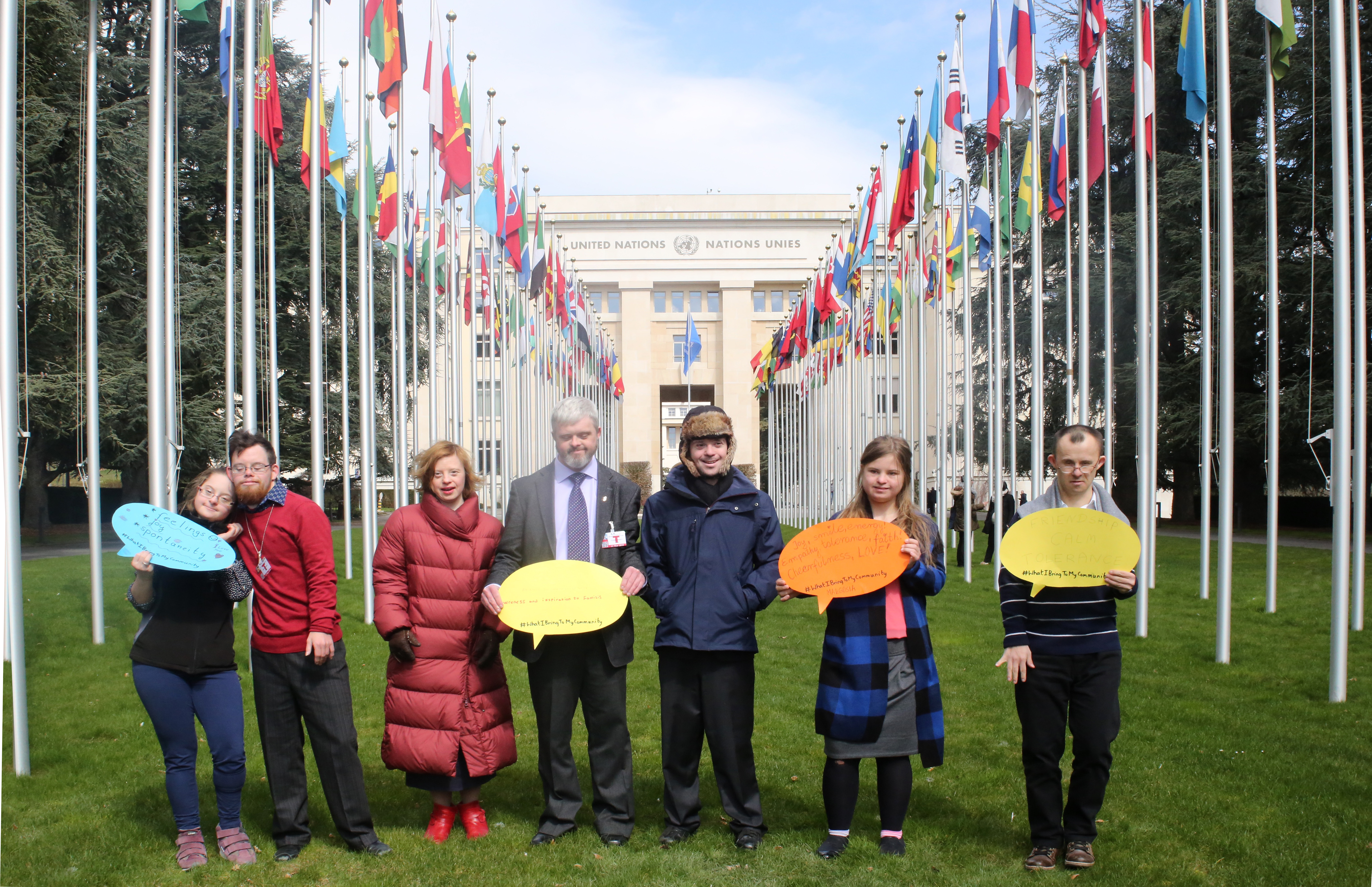
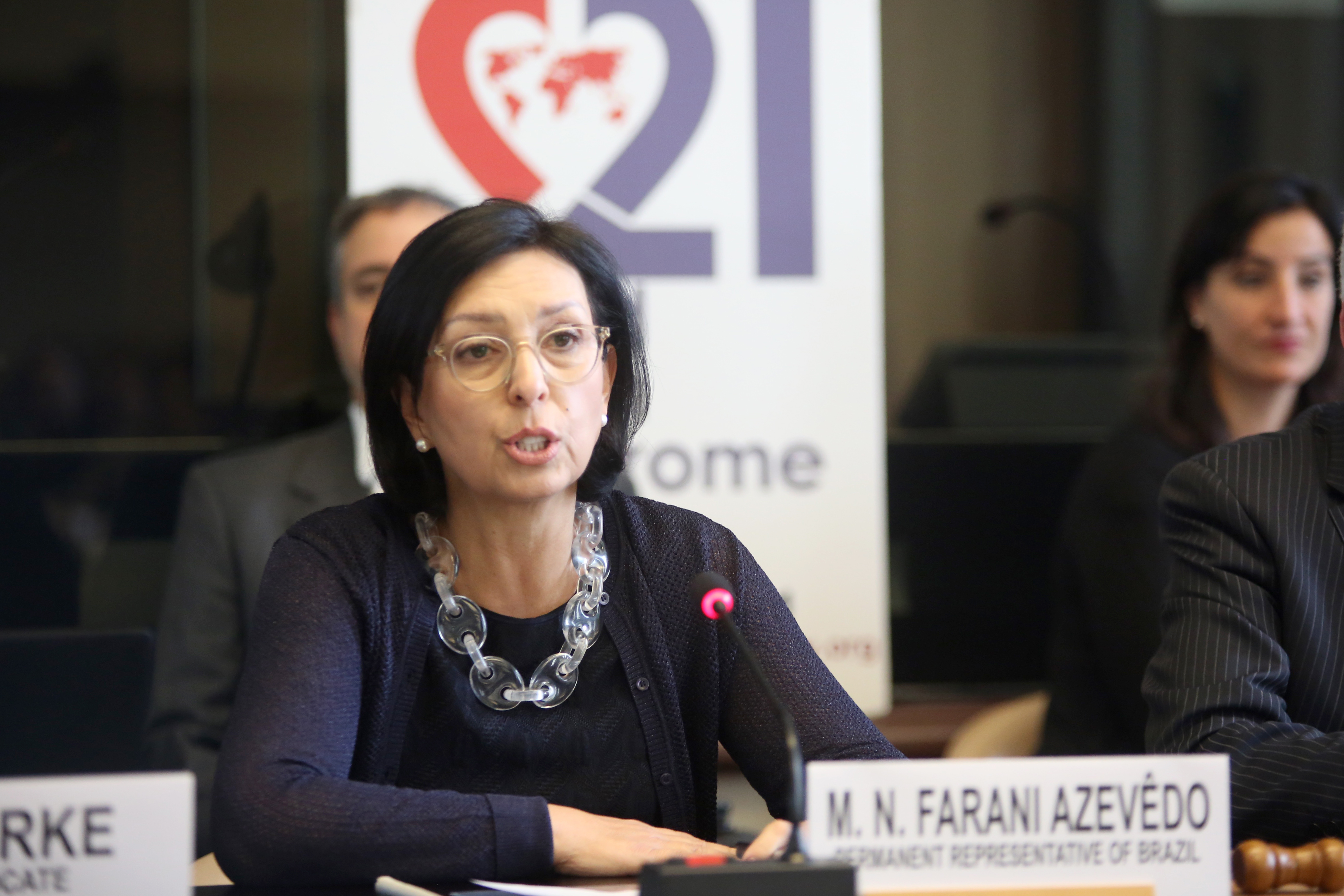
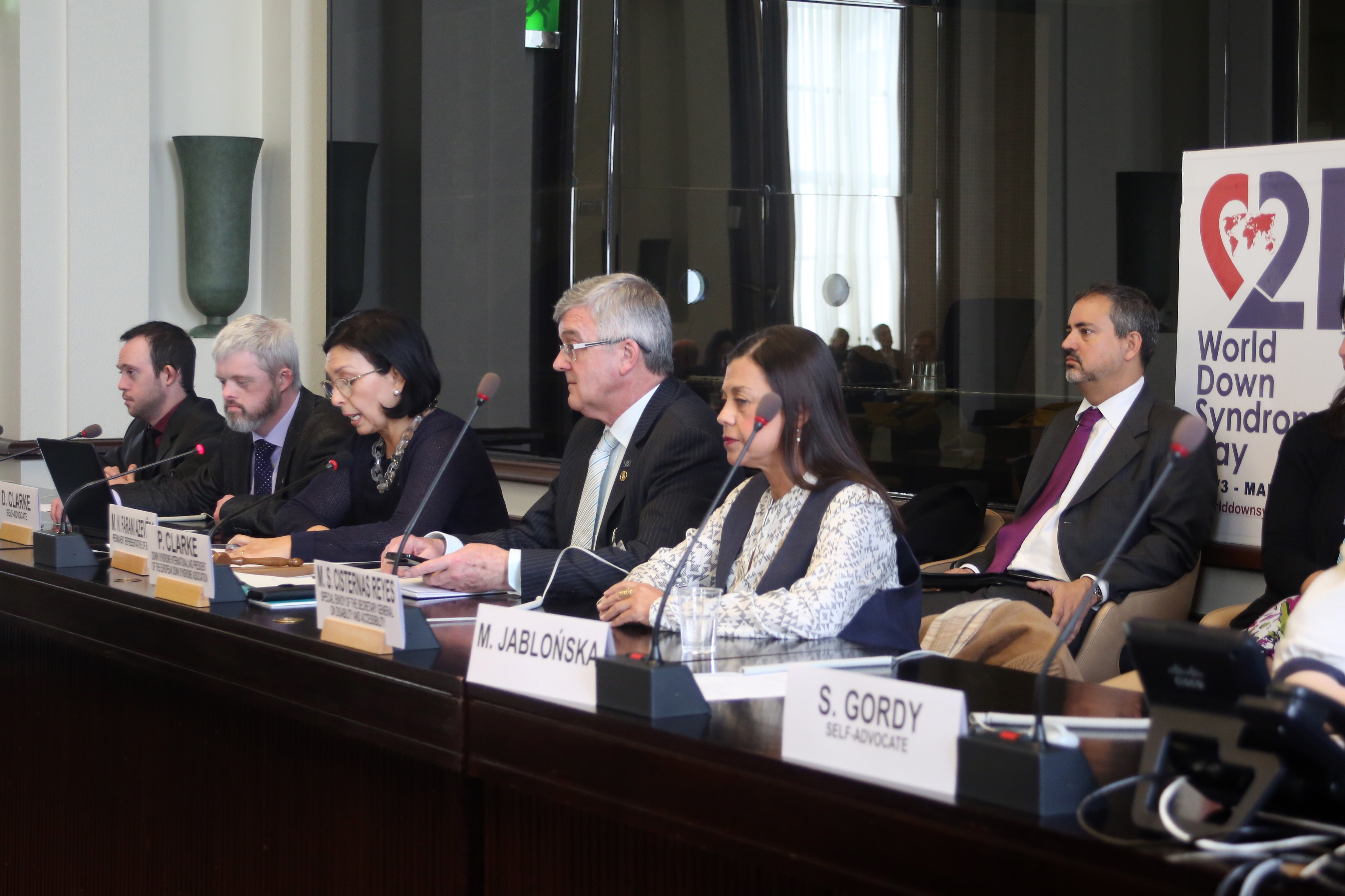
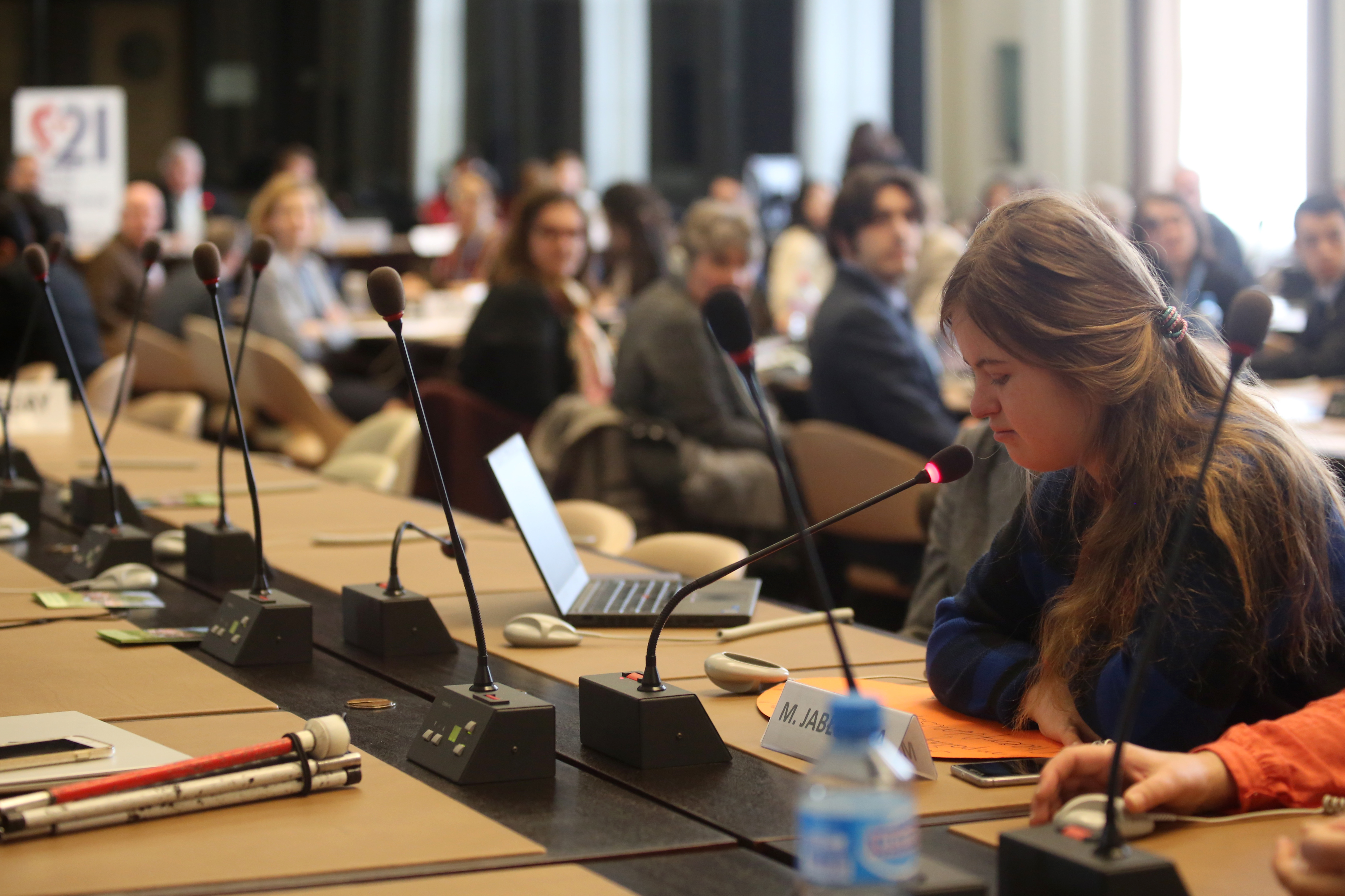
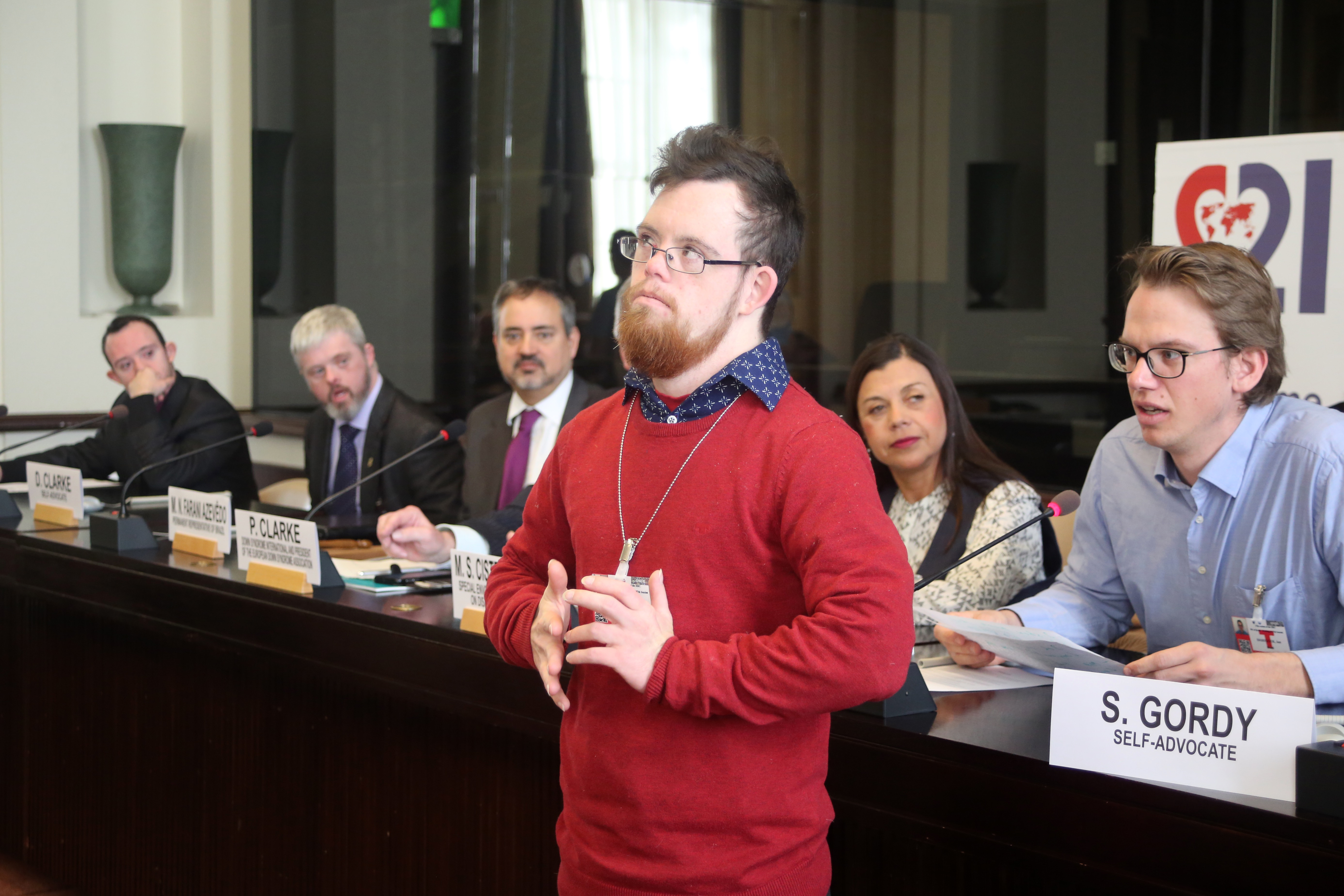
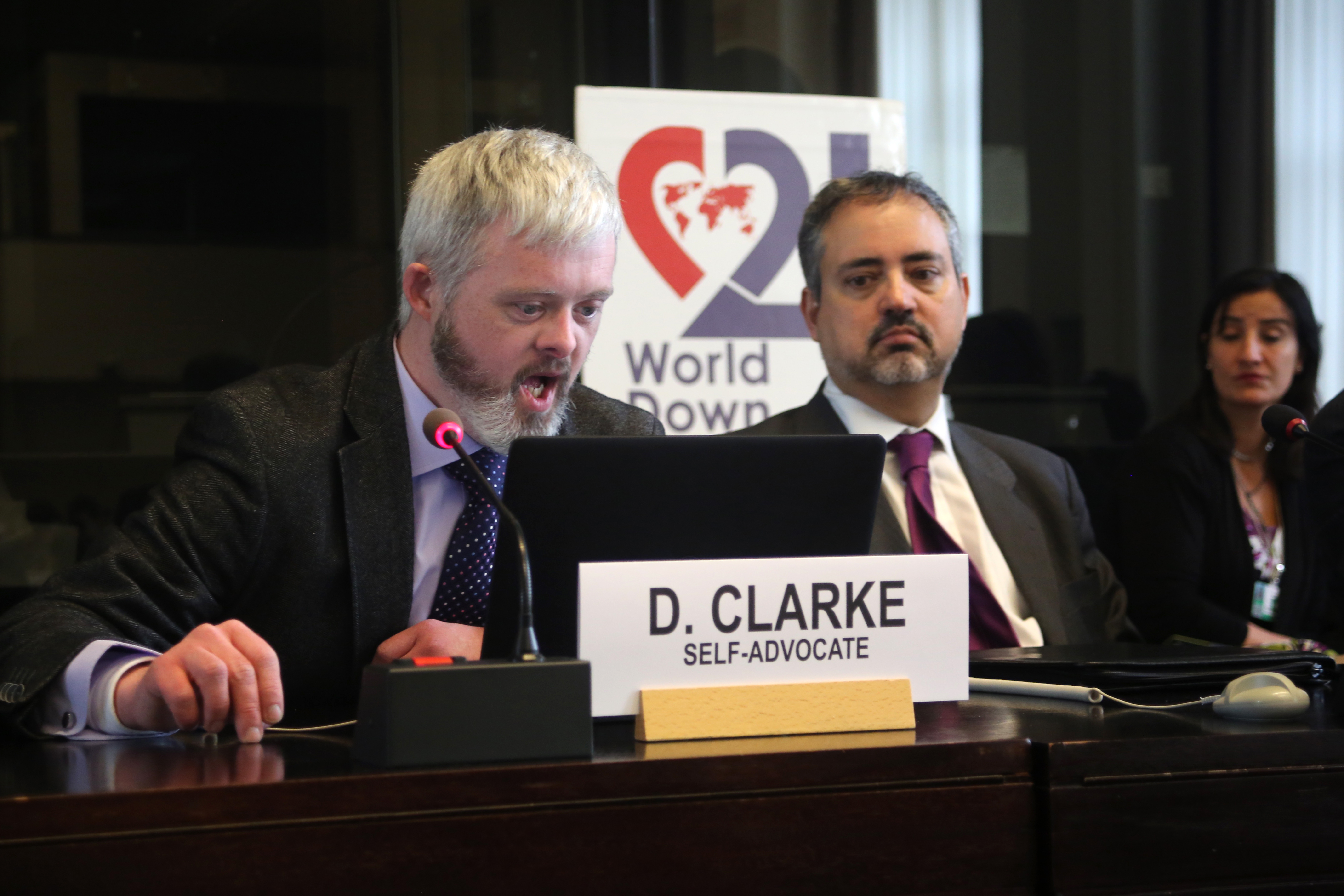
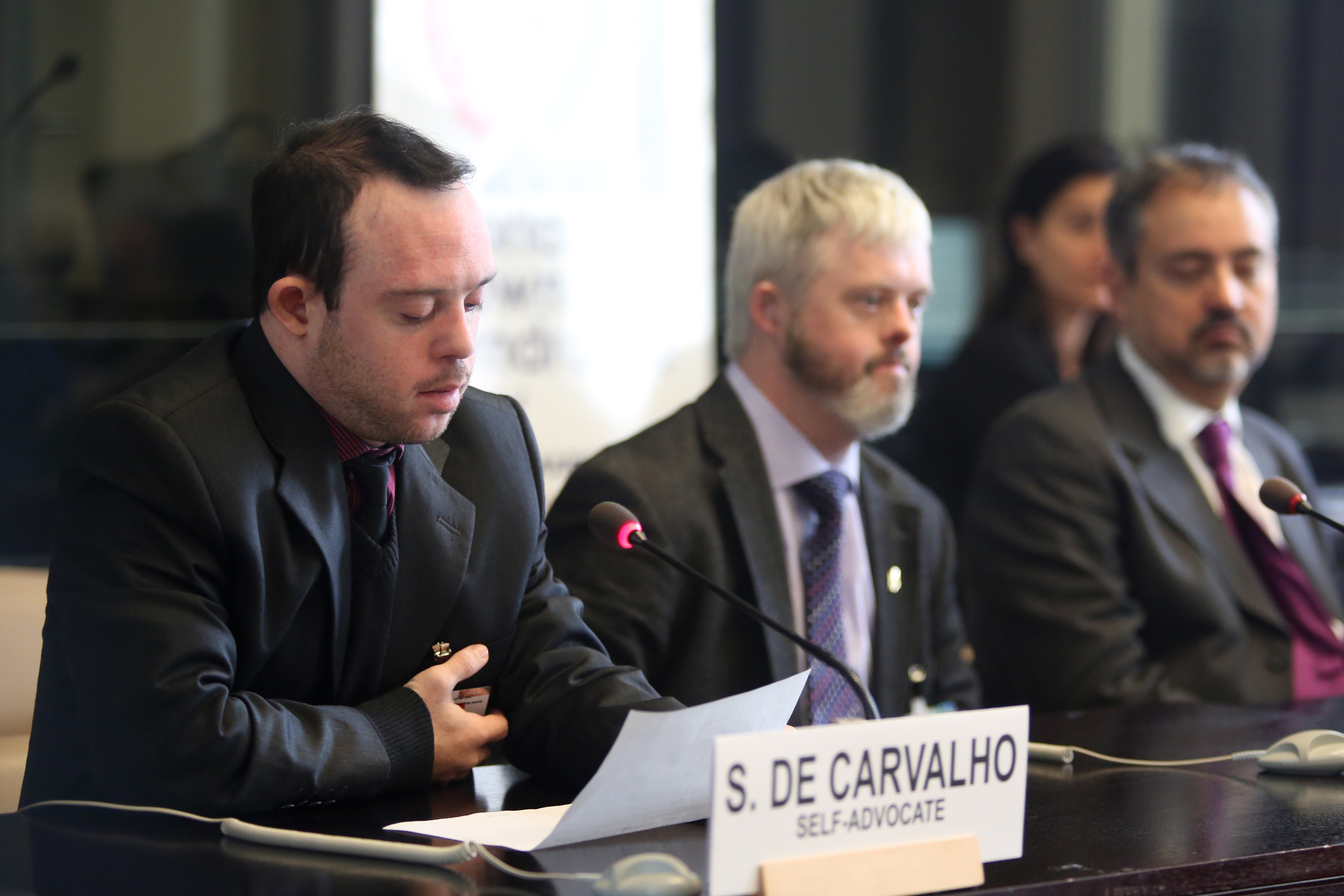
To mark the celebration of World Down Syndrome Day 2018, the Permanent Mission of Brazil to the UN in Geneva and Down Syndrome International organized the side event “What I bring to my community – Enabling all persons with Down syndrome to speak up on how they can contribute and live fulfilling lives, fully included in the community during the 37th Session of the Human Rights Council at the Palais des Nations of the United Nations, in Geneva.
The event was attended by 80 people, including people with Down Syndrome, their family members, country representatives, NGOs and professionals.
The event was open by Ambassador Maria Nazareth Farani Azevêdo, Permanent Representative of Brazil to the UN in Geneva (speech below), followed by Prof. María Soledad Cisternas Reyes, Special Envoy of the Secretary General on Disability and Accessibility. Pat Clarke, President of the European Down Syndrome Association and member of the board of Down Syndrome International, moderated the panel. Self-advocates David Clarke, from Ireland, Samuel Sestaro de Carvalho, from Brazil, Sarah Gordy, from the United Kingdom and Damian Bright, from Switzerland.
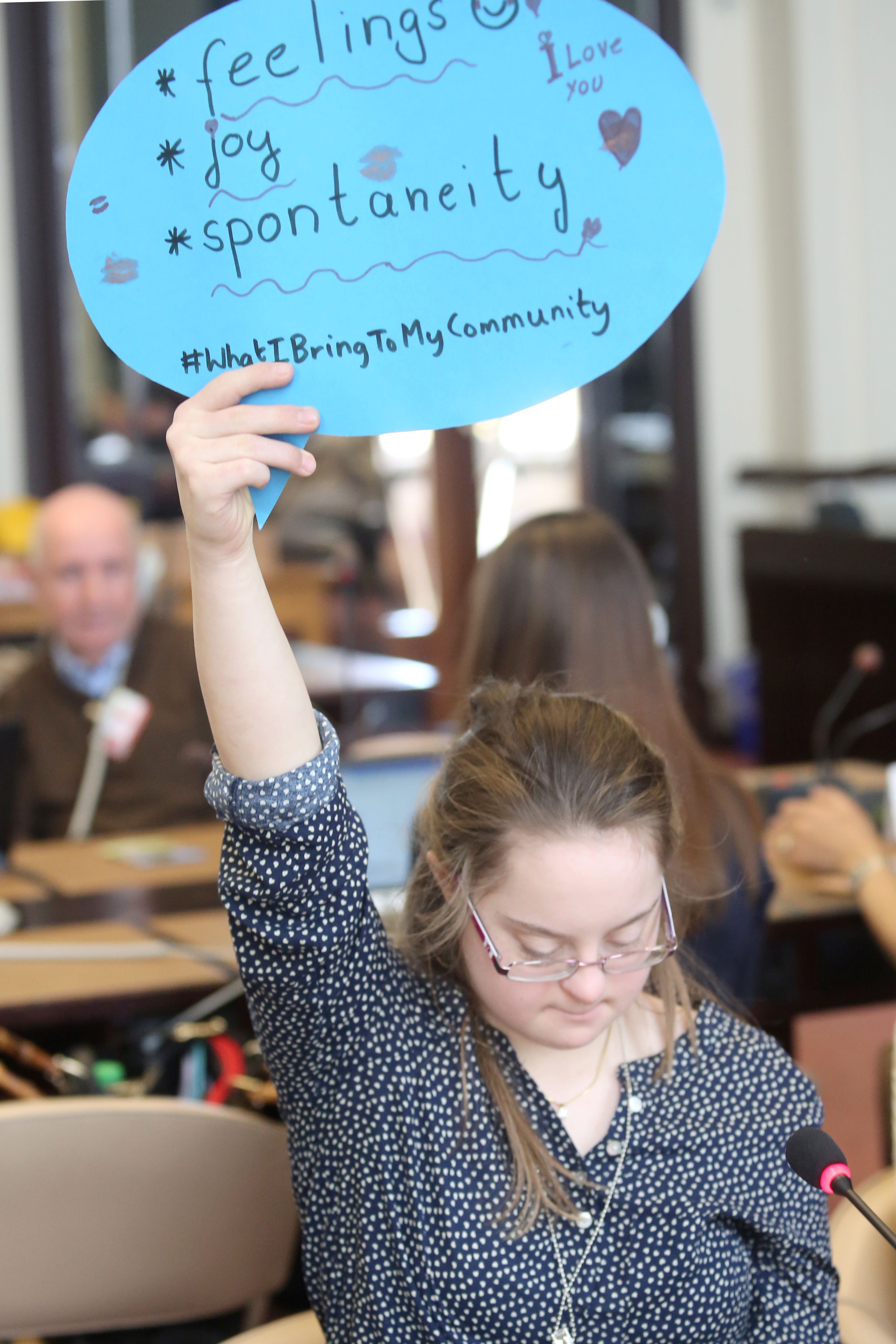
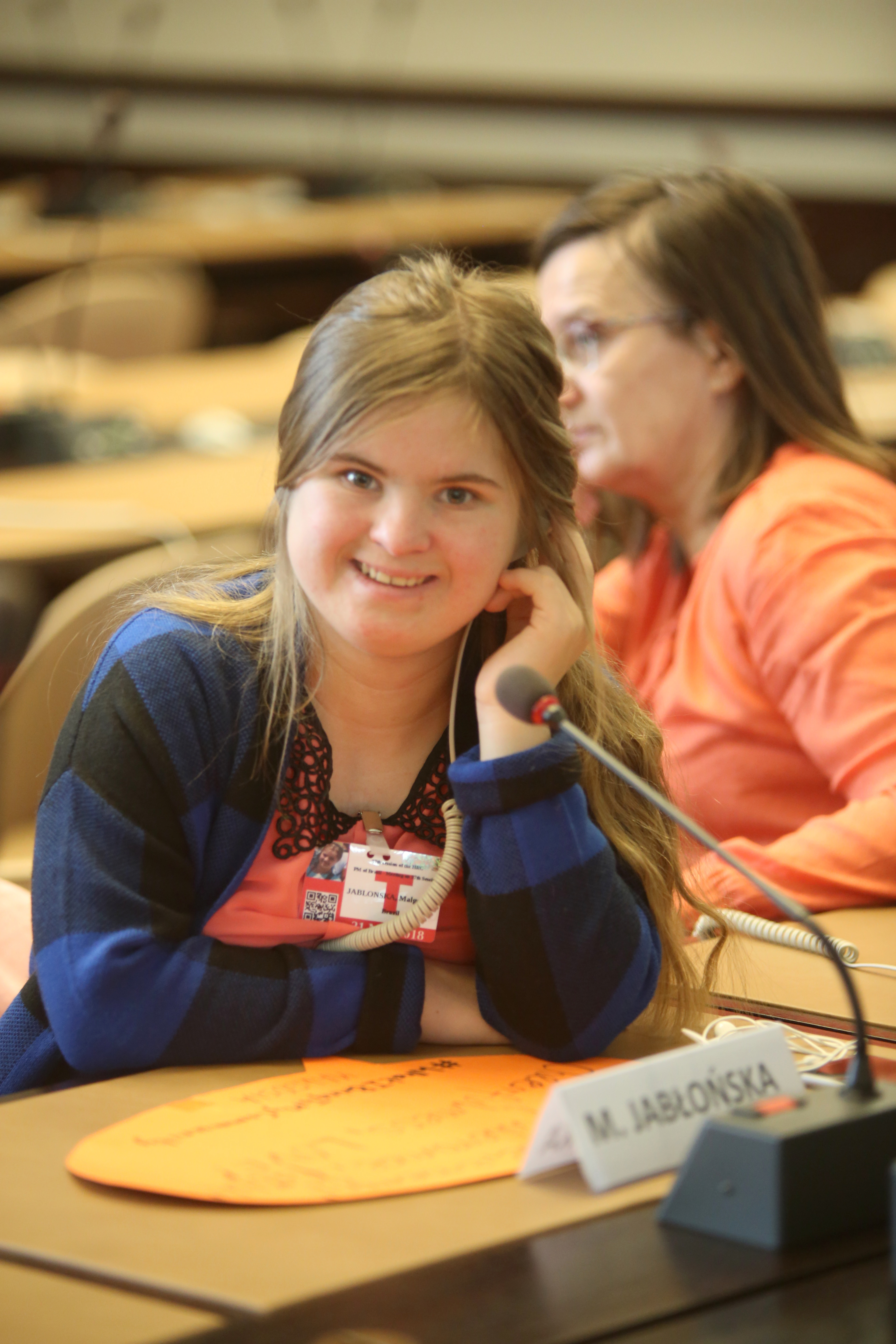
The Israeli Ambassador Aviva Raz Schechter and Ambassa
dor Miriam Shearman, UK Deputy Representative, asked questions to the panelists, followed by statements by self-advocates Malgozarta Jablonska, from Poland, David O’Brien, from Ireland, Pearl Luthy, from New Zealand, Viviane Rath, from Switzerland and Cai Zonghao, from China.
A summary and a video of the event will be available soon.
Concept note
World Down Syndrome Day (WDSD)
WDSD is a global awareness day recognised since 2012 by the UN, which takes place on 21 March every year. 21 March, or 21:3, signifies the triplication of chromosome 21, unique to persons with Down syndrome. On 19 December 2011, the United Nations General Assembly declared 21 March as World Down Syndrome Day (A/RES/66/149).
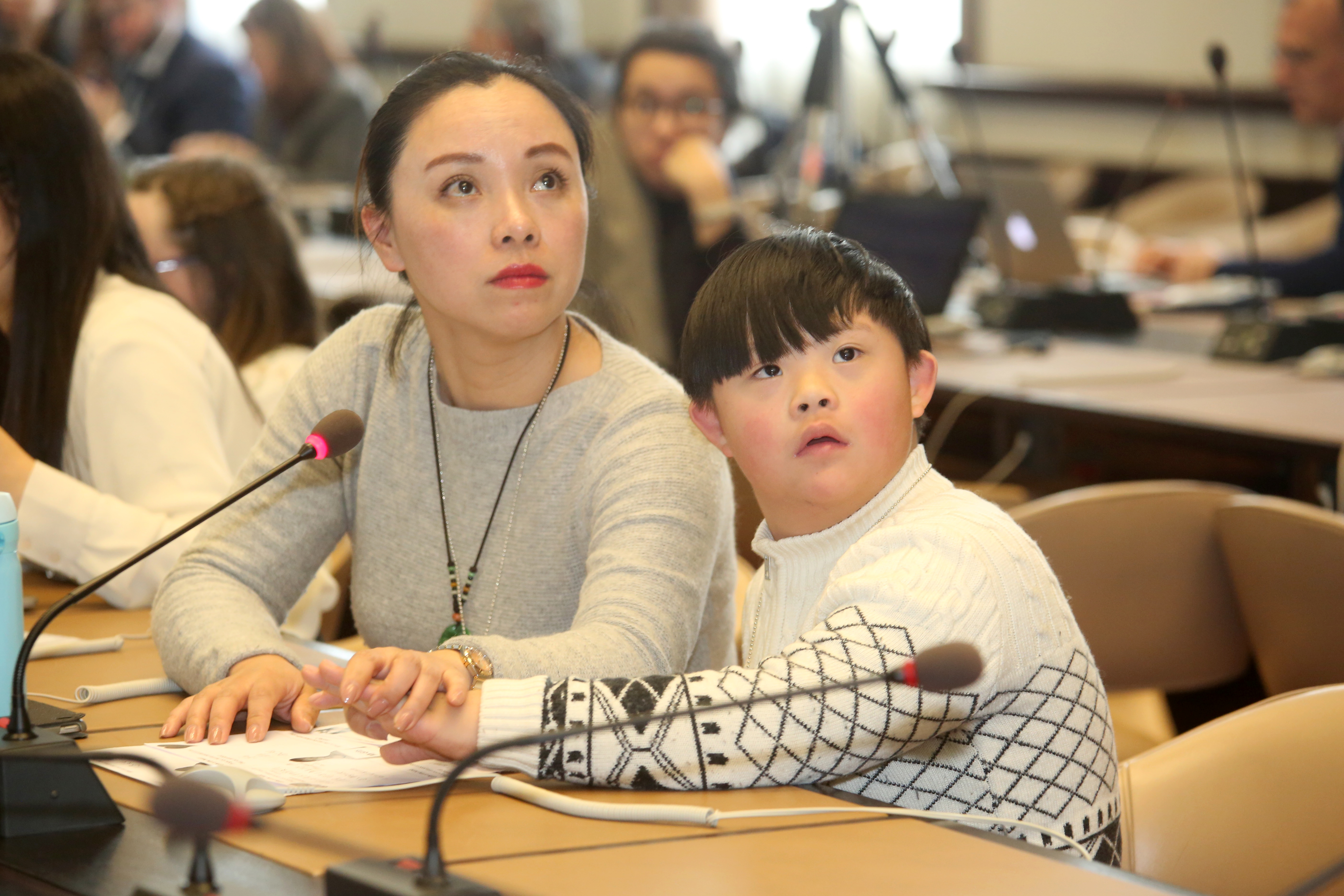
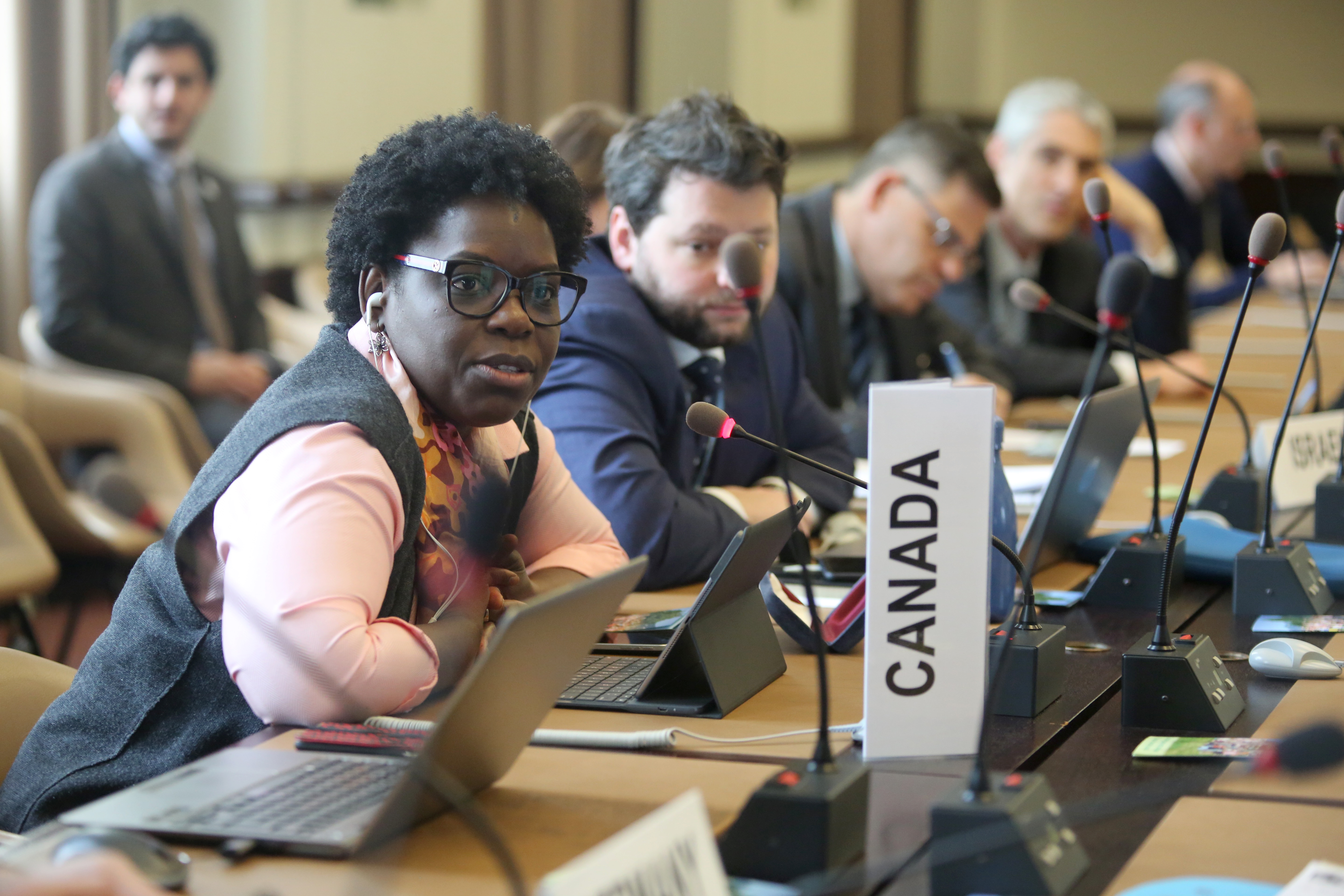
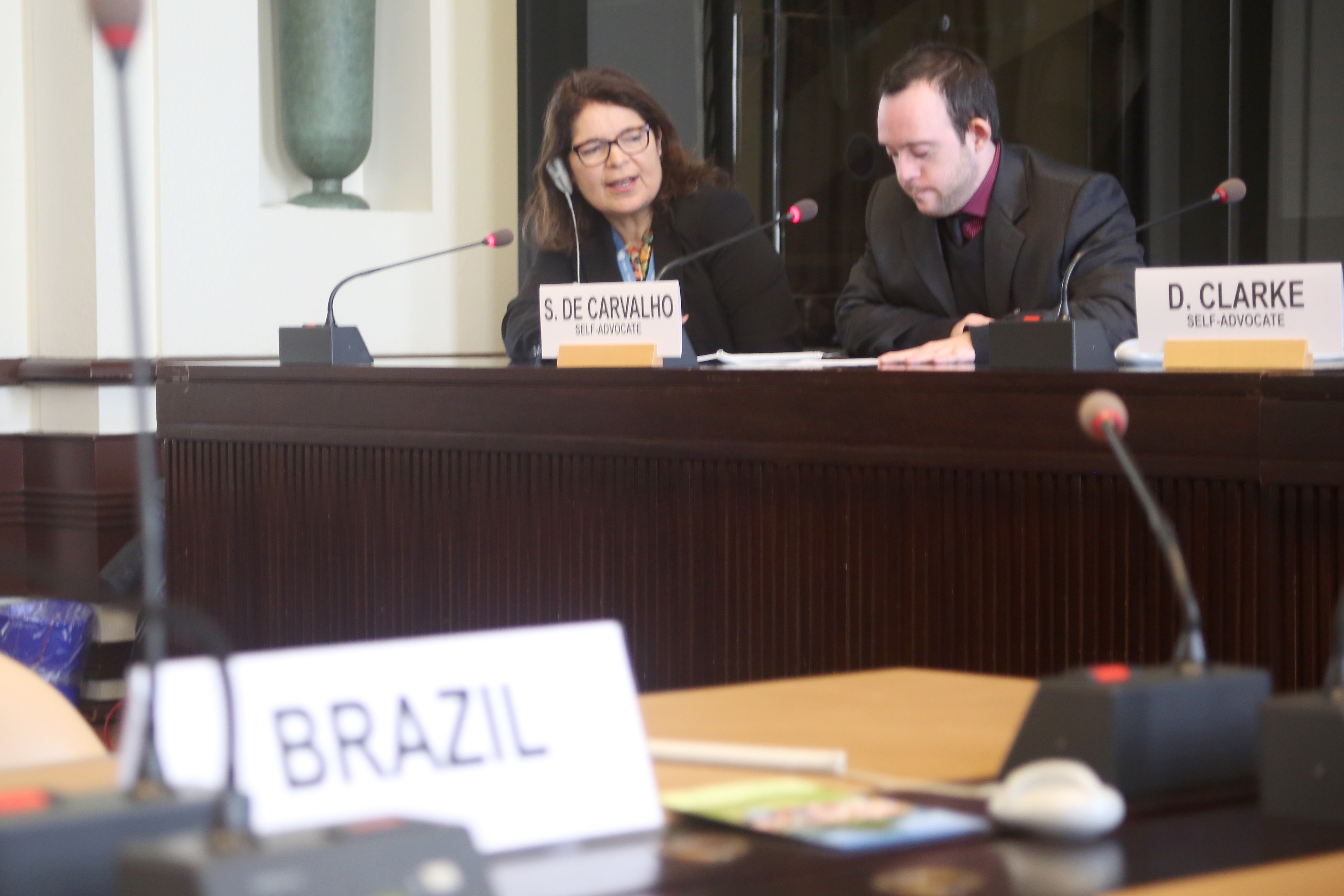
Summary of event
The overall aim of the event will be for persons with Down syndrome to reach out to government and UN officials to ensure they see how persons with Down syndrome can and do make meaningful contributions to the community throughout their lives. In doing so, we hope to encourage these key stakeholders to disseminate this message through their work to bring about change and ensure persons with Down syndrome have opportunities to contribute.
Participants will comprise a mix of persons with Down syndrome, supporters and advocates, government and UN officials and NGO representatives with professional experience and expertise. Efforts will be made to invite participants from a diverse range of countries and world regions.
The side event will feature presentations by self-advocates with Down syndrome and an “open format” discussion to encourage maximum learning and arrive at tangible follow up actions.
Moderator: Pat Clarke, President of the European Down Syndrome Association
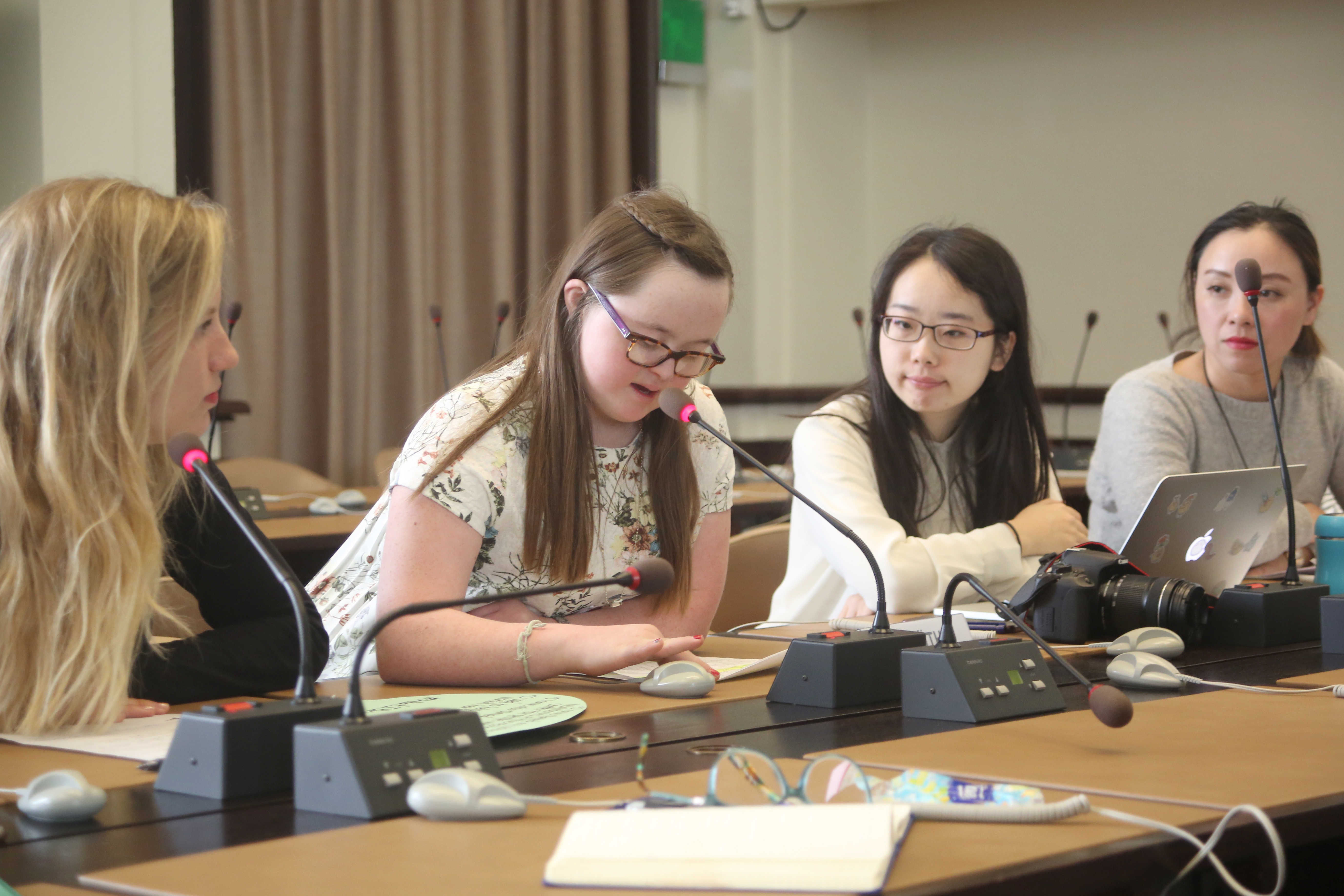
Opening Remarks: Ambassador Maria Nazareth Farani Azevêdo, Permanent Representative of Brazil to the UN in Geneva
Prof. María Soledad Cisternas Reyes, Special Envoy of the Secretary General on Disability and Accessibility
Panellists: David Clarke, Self-Advocate – Ireland
Małgorzata Jabłońska, Self-Advocate – Poland
Samuel de Carvalho, Self-Advocate – Brazil
Sarah Gordy, Self-Advocate – United Kingdom
Format: After opening statements from the Permanent Representative of Brazil and the Special Envoy of the Secretary General, self-advocates with Down syndrome will present on the subject ‘What I bring to my community’. These presentations may be as a group or be in question and answer format, to ensure that all self-advocates with Down syndrome are able to participate fully.
Then there will be an ‘open format’ discussion with questions to be answered by human rights advocates, self-advocates with intellectual disabilities, and other participants.
Organisation: This event is organised by the Permanent Mission of Brazil to the UN in Geneva and Down Syndrome International, co-sponsored by the Permanent Mission of India, the Permanent Mission of Israel, the Permanent Mission of the United Kingdom and the Office of the High Commissioner for Human Rights, with the support from the Special Rapporteur on the rights of persons with disabilities and the International Disability Alliance.
21 March 2018 – 10:30
Room VII, Palais des Nations
Opening remarks – Ambassador Maria Nazareth Farani Azevêdo, Permanent Representative of Brazil to the UN in Geneva
It is a great honor for us to host, for the second time in Geneva, this side event to mark the World Down Syndrome Day, together with Down Syndrome International.
This year, we are proud to have with us in this endeavor the Permanent Missions of India, Israel and the United Kingdom, as well as the Office of the High Commissioner for Human Rights and the International Disability Alliance. The Special Rapporteur on the rights of persons with disabilities is also supporting this celebration.
I would like to specially thank the Permanent Mission of Israel, that is providing captioning to the event and the International Disability Alliance, that is supporting us with webcasting.
I would also like to warmly welcome all participants: representatives of Permanent Missions, of civil society, of international organizations, webcasters, and most importantly, persons with Down syndrome, who will express their views on how than can contribute and live fulfilling lives and by fully included in the community.
As you know, 21 March was declared by the UN General Assembly as World Down Syndrome Day by a resolution proposed by Brazil in 2011. This resolution was adopted by consensus and was co-sponsored by 78 UN Member States.
Brazil has participated actively in the draft of the Convention on the Rights of Persons with Disabilities and is committed to adjust laws and public policies to promote the inclusion of persons with disabilities in society on a full and equal basis with others. Our best achievement so far has been in education, where the presence of students with disabilities in regular schools has increased in the last decade to over 90% in public basic education. Reflex of that, is that we see more and more people with disabilities in universities, including over 40 students with Down syndrome, who are undertaking their studies for their future careers.
Before concluding, allow me to inform you that right after this side event, the Permanent Mission of India will host a second meeting, in this same room, also to mark the World Down Syndrome Day. We are all invited to stay and to continue to constructively debate on the rights of persons with Down syndrome in the afternoon.
As we move towards the 2030 Agenda of Sustainable Development Goals, which specifically calls for the participation of people with disabilities in every aspect of society, we hope that soon we will have no need for international days. But until then, let’s give the floor to people with Down syndrome.
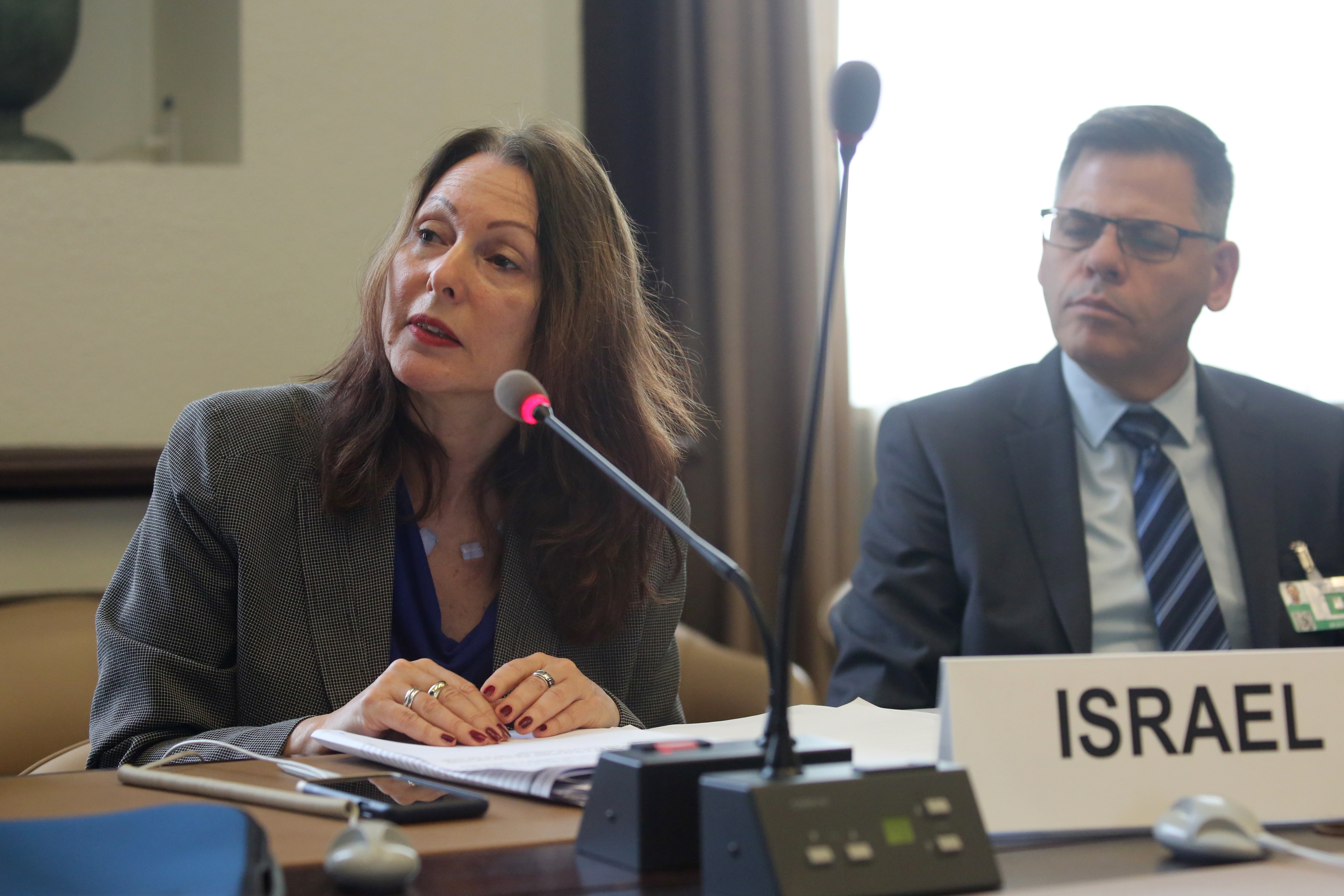
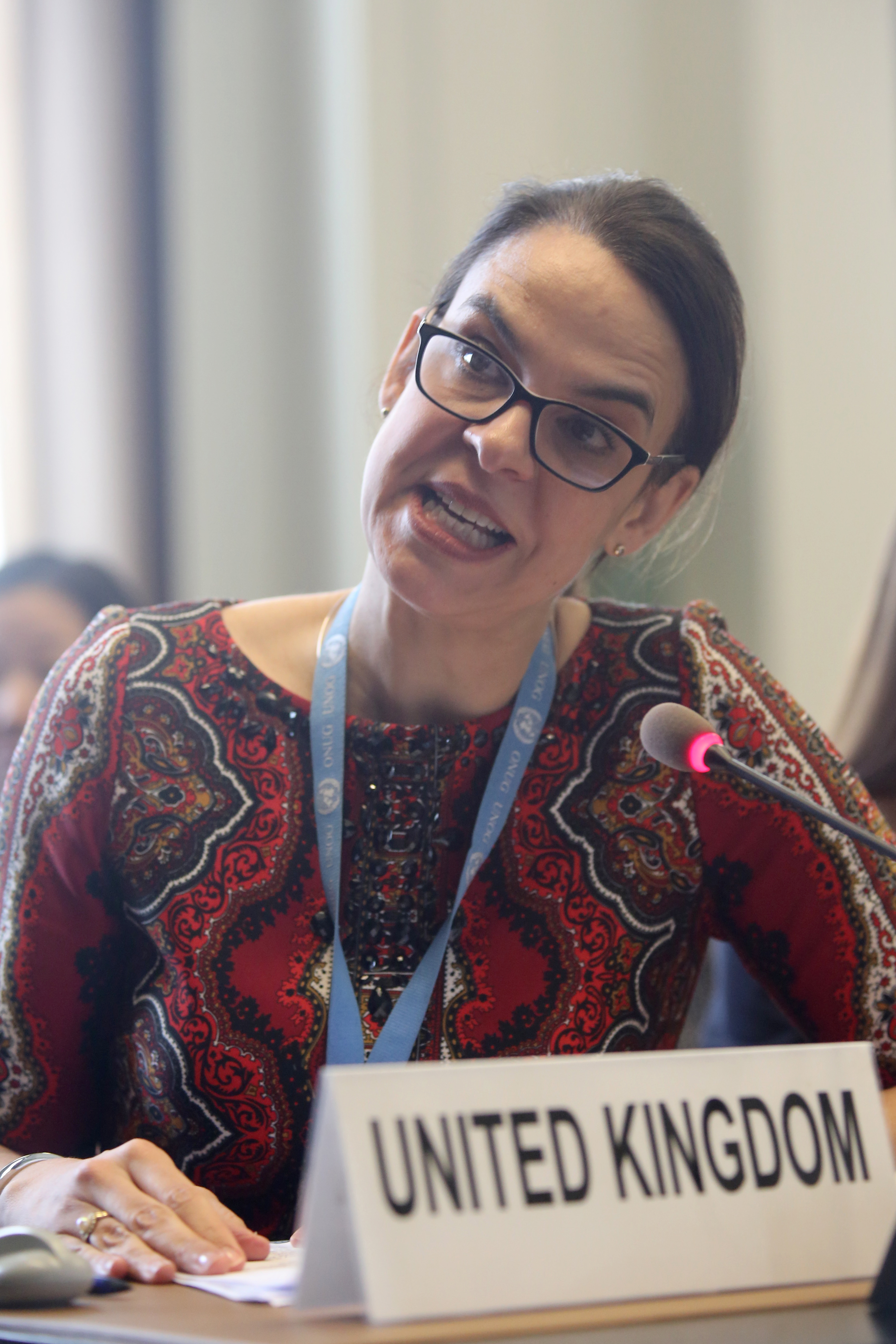
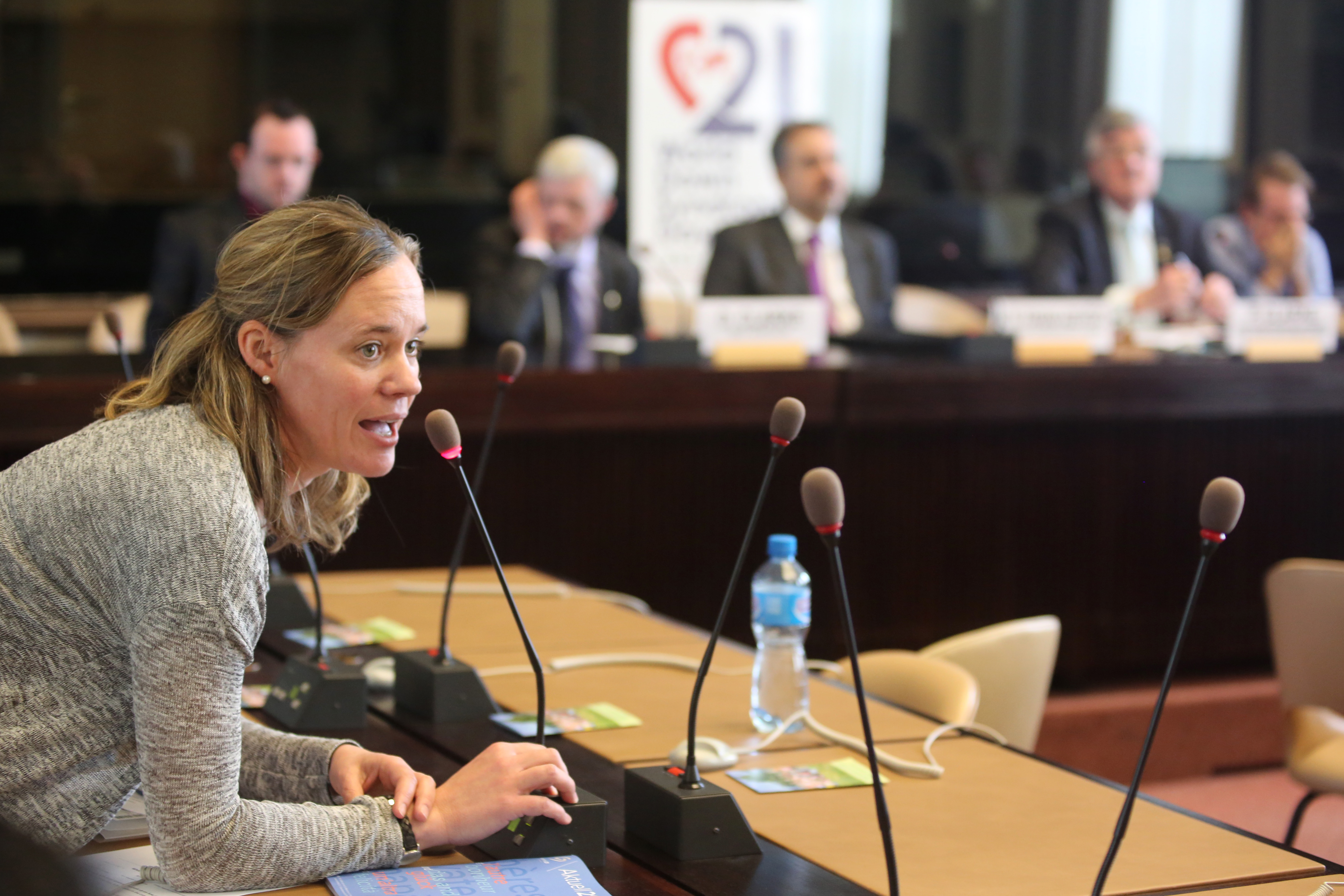
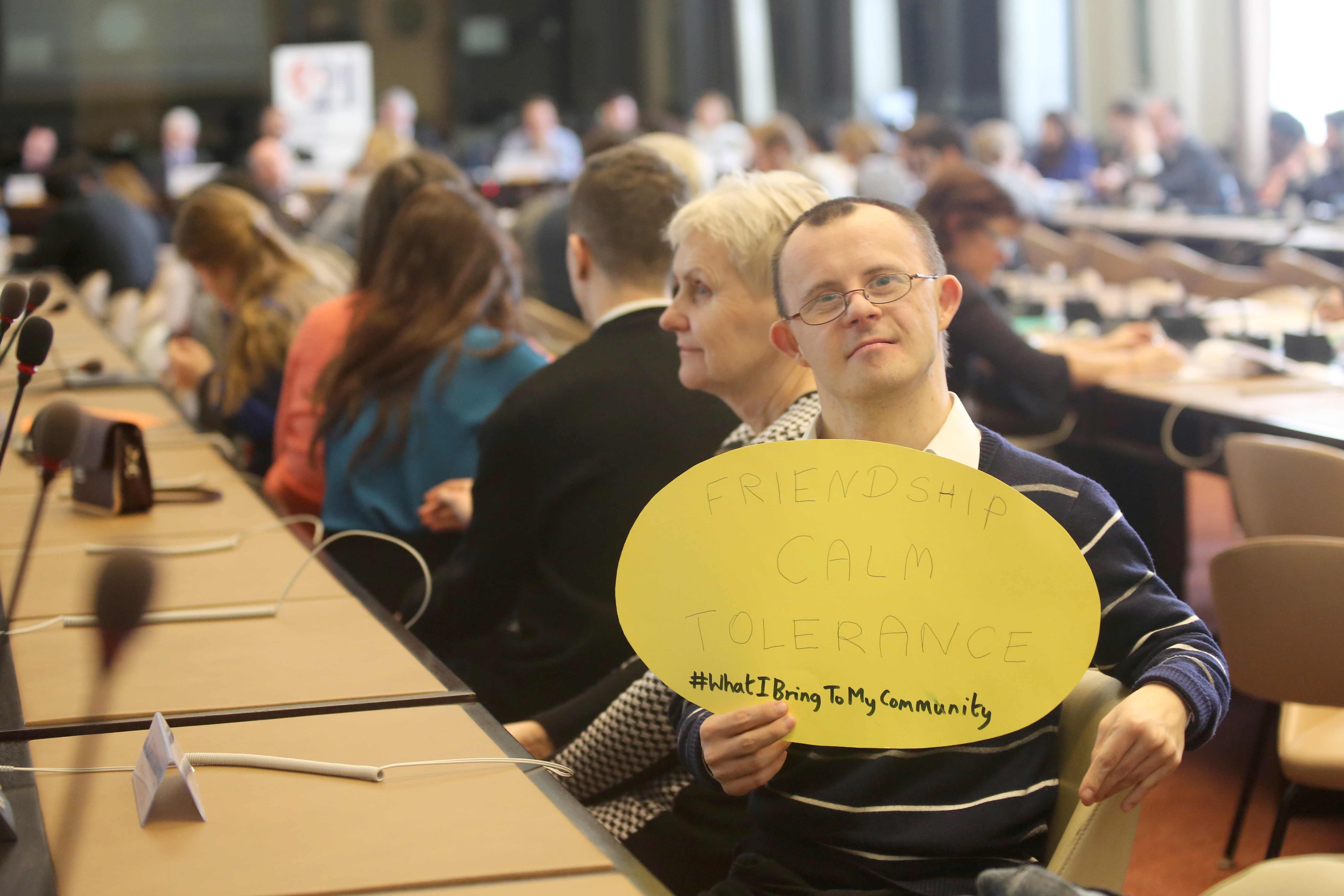
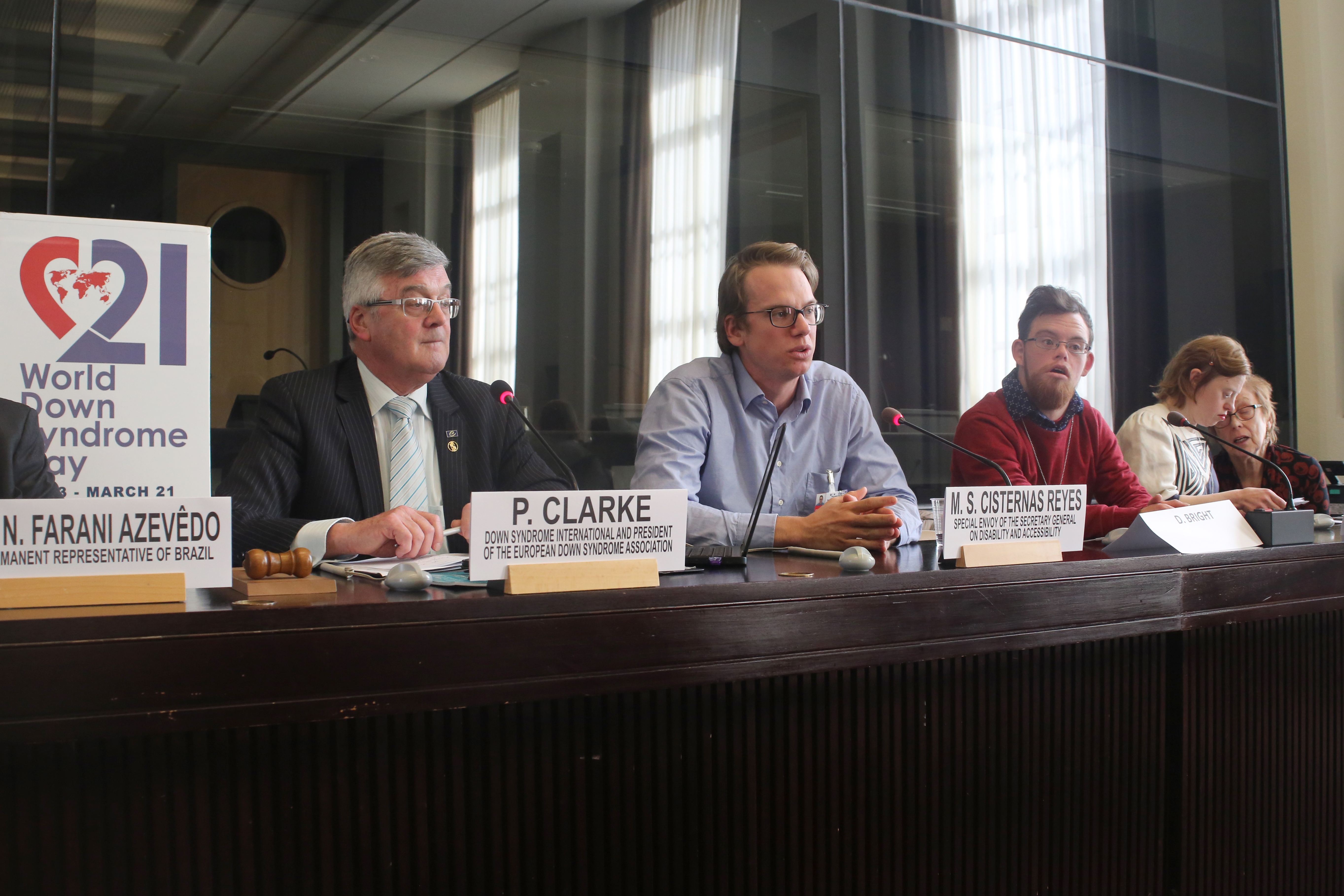
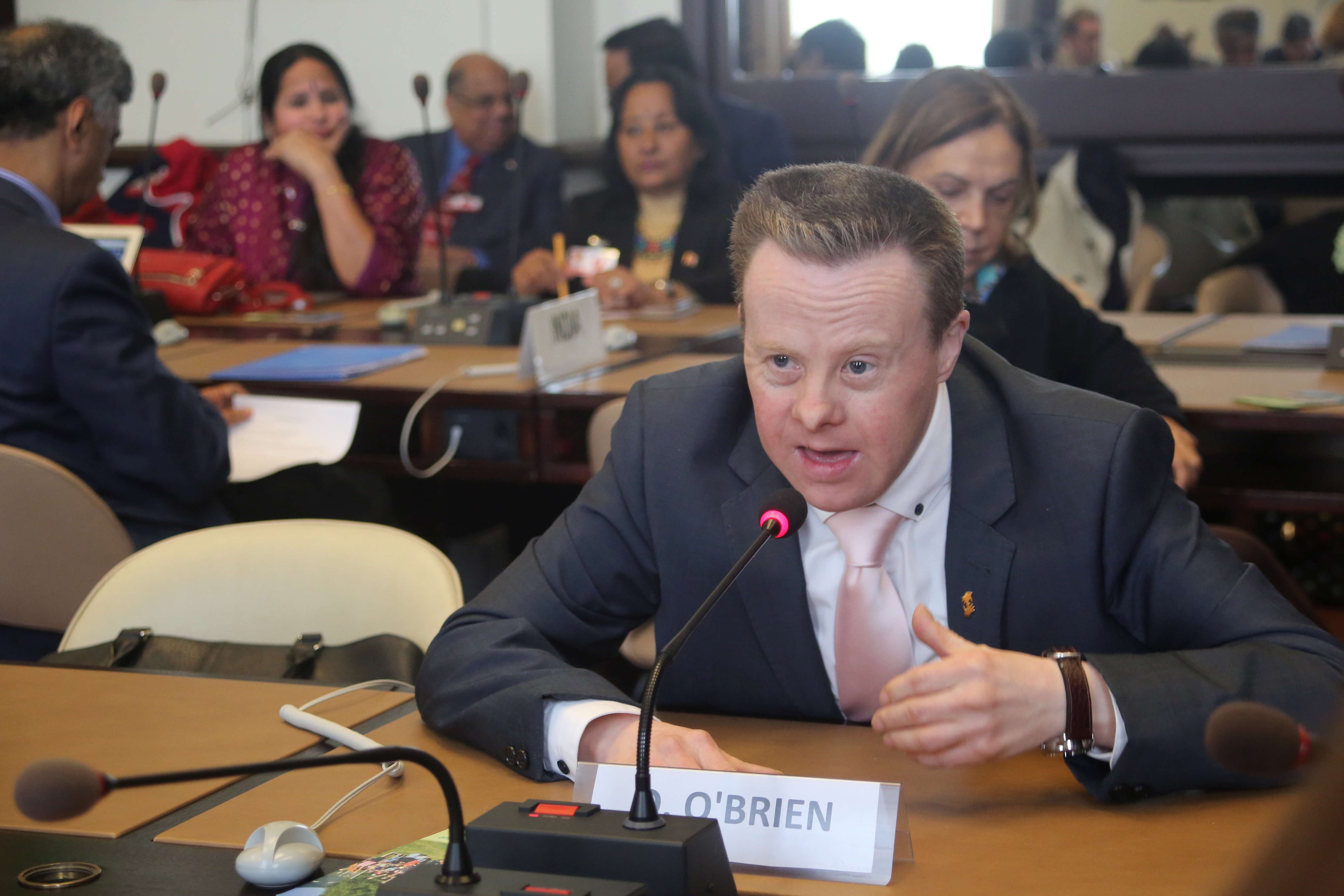
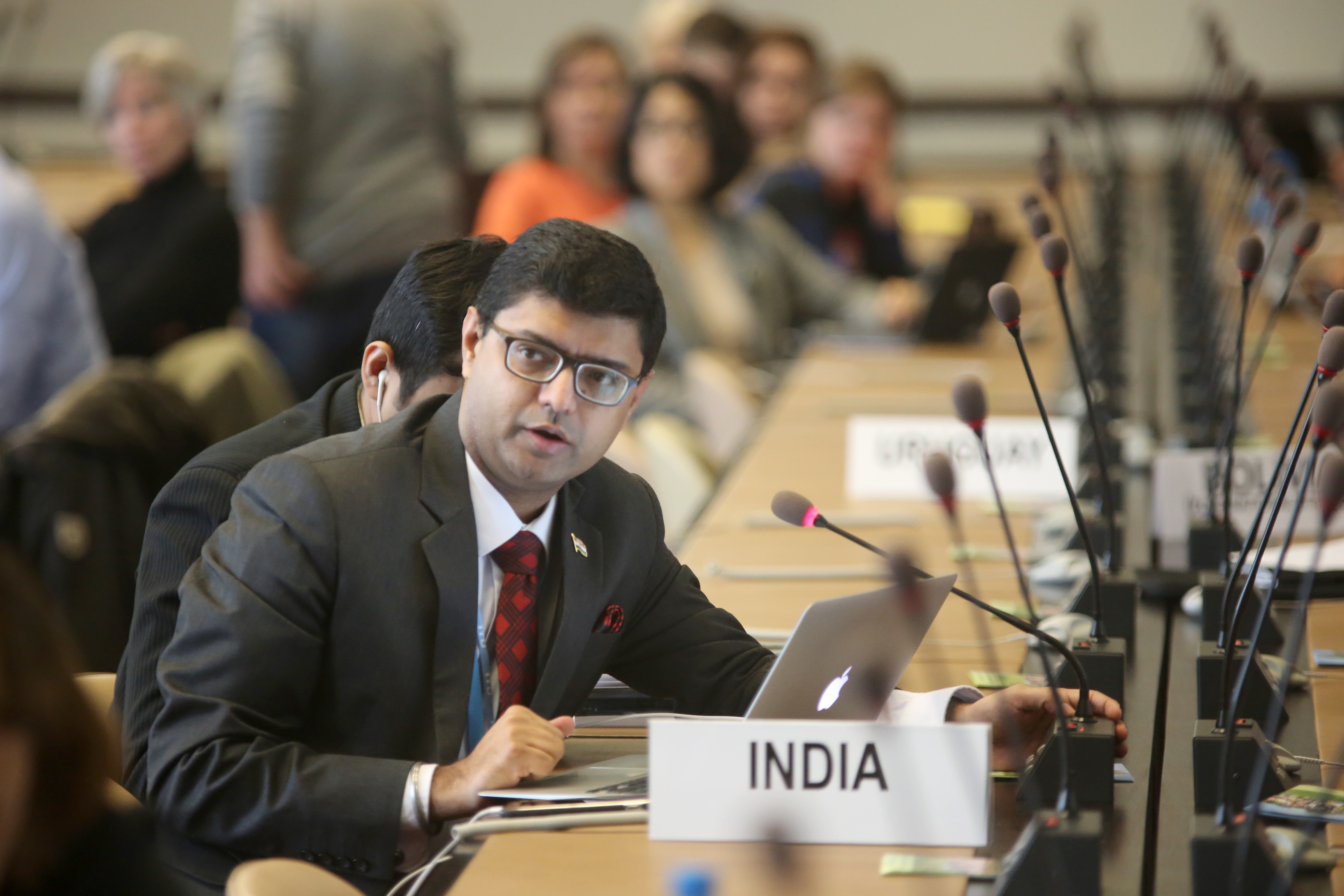
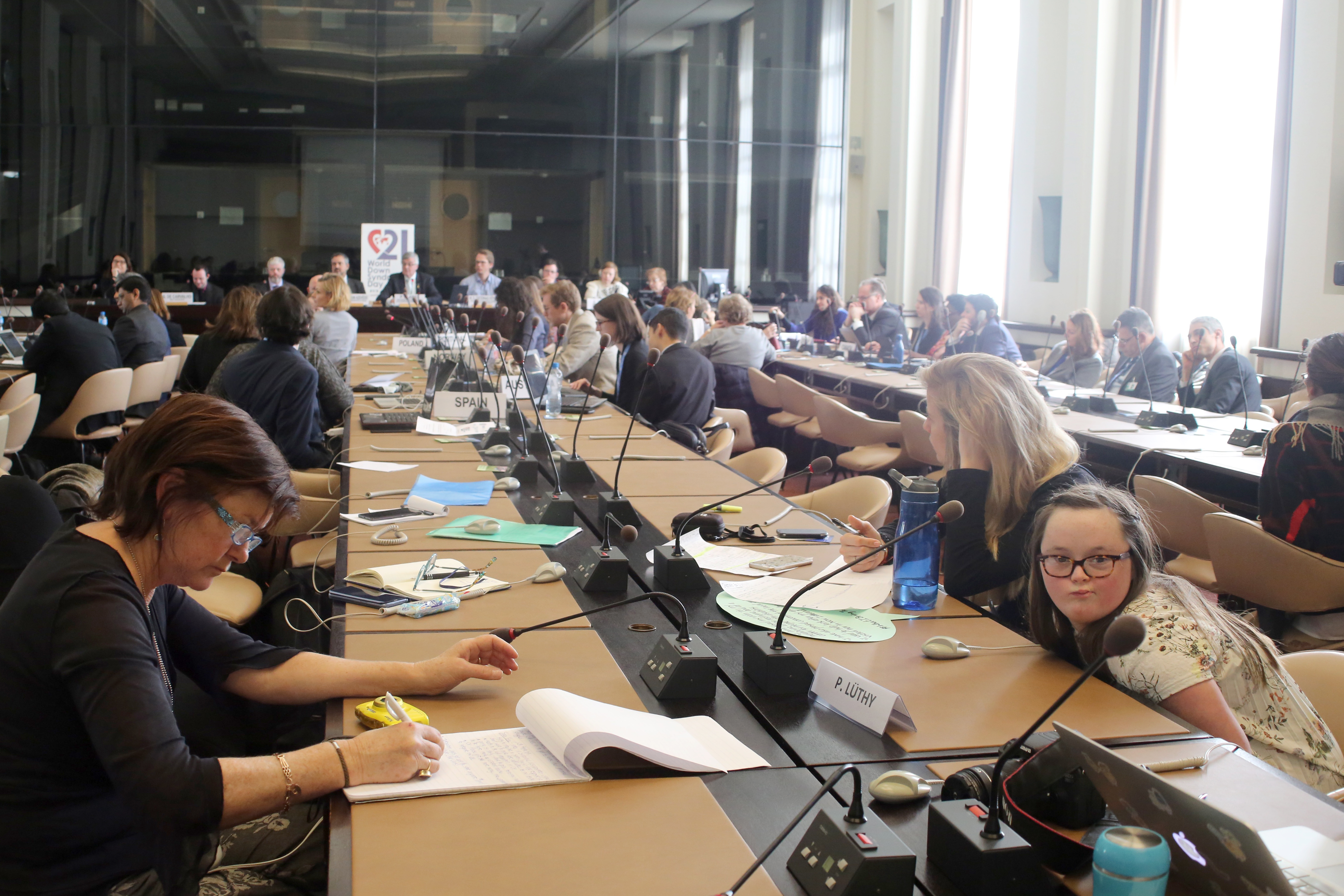
SUMMARY OF THE EVENT
Thank you
On behalf of Down Syndrome International and all the self-advocates that presented at the event, a thanks to the Permanent Mission of Brazil for sponsoring the event and to the Permanent Missions of Israel, the United Kingdom and India for co-sponsoring it. Thanks also to the Office of the High Commissioner for Human Rights, the Special Rapporteur on the Rights of Persons with Disabilities and the International Disability Alliance for their support. Finally thanks to everyone who attended the event.
About this document
There were four main topics covered in the event: self-advocacy; contribution to community; employment; and political participation. This document will give an overview of the key issues around each topic and then give recommendations for State Parties.
- 1. Self-advocacy
Self-advocacy, being able to represent oneself and advocate for one’s rights, is incredibly important for people with Down syndrome. People with Down syndrome have for a long time had their voices suppressed and as a result are one of the most marginalised groups in most countries.
State Parties that have ratified the UNCRPD have an obligation to “consult with and actively involve persons with disabilities” (including people with Down syndrome) “ in the development and implementation of legislation and policies to implement the present Convention, and in other decision-making processes concerning issues relating to persons with disabilities” (Article 4.3).
Recommendations for State Parties
- Ensure the inclusion of self-advocates with Down syndrome in decision making and consultative processes at local, regional, national and international levels.
- Consider supporting self-advocacy training for people with Down syndrome, especially if there is not an active self-advocacy presence locally.
2. Contribution to Community
People with Down syndrome can and do make meaningful contributions throughout their lives, whether in schools, workplaces, living in the community, public and political life, culture, media, recreation, leisure and sport. But for this to happen, inclusion is fundamentally important!
Pearl Lüthy – self-advocate, New Zealand:
I believe that people with Down syndrome are clever and creative. They should be allowed to go to school with their friends. They can do good jobs. They should be able to live where they want. They should be able to go out where they want. And people with Down syndrome should be able to get married and have babies and a family.
Recommendations for State Parties
- Ensure children with Down syndrome are able to access good quality inclusive education.
- Promoting the right of people with Down syndrome to live and be included in their communities, including providing adequate support services.
3. Employment
People with Down syndrome make excellent employees in a variety of roles and industries. Studies and employer testimonies show that they have low absenteeism rates, commit to roles for long periods of time, and are enthusiastic team members.
But employment rates of people with Down syndrome remain low. This is partly due to prejudice and discrimination, but also because employers are not confident about how to include people with Down syndrome into their workforce. Supported employment programmes that work with employers and people with Down syndrome during transitions into work have proven very successful, but have not been scaled up.
Damian Bright – self-advocate, Switzerland (currently studying to become a teaching assistant):
In my work with children, I have patience. I am really happy to spend time with the kids in the school class, and with my training I want to make inclusive education more popular in Switzerland.
Recommendations for State Parties:
- Ensure effective anti-discrimination legislation is in place with regards to employment, including adequate sanctions.
- Replicate and scale up successful supported employment programmes for people with Down syndrome
4. Political participation
People with Down syndrome represent a population of potential voters and activists, but require accessible information to ensure they are able to participate meaningfully in politics.
David O’Brien – self-advocate, Ireland:
We have to be listened to and not discriminated against. We understand things the same as everyone else.
Recommendations for State Parties
- Ensure that people with Down syndrome are legally able to vote and that all government officials and election officials are aware of this.
- Ensure that all information and material related to elections is accessible to people with Down syndrome, including providing easy read versions.
More Information
For more information on any of the issues covered above, please contact Down Syndrome International:
Website: www.ds-int.org
Email: contact@ds-int.org











